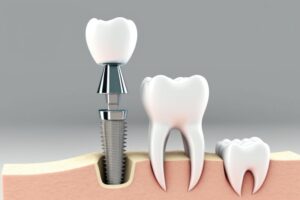
Dental implants are the gold standard for tooth replacement. They rebuild lost teeth from the roots up, and they provide outstanding stability, strength, and longevity. But what if your dentist has informed you that you are not eligible for traditional dental implants? Do not lose hope. You might become a candidate after some preliminary procedures, or you might be a good candidate for mini dental implants. What exactly are mini dental implants, and how can you know if they are right for you? This blog post explains.
What Are Mini Dental Implants?
Dental implants are small cylinders that are usually made of a medical-grade titanium alloy. They get surgically placed into the jawbone so they can act as prosthetic tooth roots. Their job is to support crowns, bridges, or dentures.
Traditional dental implants are usually about 3.4 to 5.8 millimeters in diameter. Mini implants are much smaller. Although they are the same length as traditional implants, their diameter may be just 1.8 to 3.3 millimeters. For reference, a toothpick is usually around 2 millimeters in diameter.
Who Should Get Mini Dental Implants?
Some of the requirements for mini and traditional dental implants are the same. For example, you should be free of active gum disease, have good oral hygiene habits, and be healthy enough to undergo minor surgery.
However, the jawbone requirements between the two treatments are different. Because traditional implants are larger, they require greater jawbone size in order to be successful. Mini implants are often recommended for individuals whose jawbones have deteriorated. For example, they are sometimes ideal for long-time denture wearers, as well as those who have experienced bone loss in their jaw due to missing teeth or certain medical conditions.
With traditional dental implants, a bone graft is sometimes necessary in order for the jaw to be large enough to support successful treatment. With mini implants, a bone graft is usually not necessary, making the entire process as efficient and minimally invasive as possible.
Are Mini Dental Implants Right for You?
The best way to determine if mini implants are right for you is to visit a qualified oral surgeon. After they examine your mouth and learn about your goals for treatment, they can design a custom treatment plan. They can also educate you about the pros and cons of both mini implants and their traditional counterpart. You will be well-equipped to make an informed decision about how to replace your lost teeth.
Mini dental implants are a wonderful treatment option! Ask your oral surgeon if they are right for you.
Meet the Practice
Drs. Steve Koo, Thomas Weil, and William Shepard are board-certified oral and maxillofacial surgeons with decades of combined experience. They offer a range of dental implant services, including traditional implants, bone grafting, mini dental implants, and more. To learn how they and our team may be able to help you rebuild your lost teeth, contact our Houston office at 713-783-5560.

